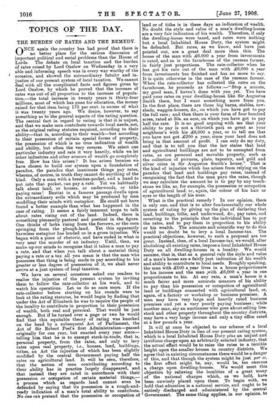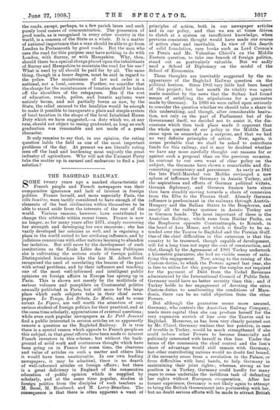TOPICS OF THE DAY.
THE BURDEN OF RATES AND THE REMEDY.
ONCE again the country has had proof that there is no better place for the serious discussion of important political and social problems than the House of Lords. The debate on local taxation and the burden of rates raised by Lord Onslow on Wednesday in a very able and informing speech was in every way worthy of the occasion, and showed the extraordinary fatuity and in- justice of our present system of local taxation. We cannot deal with all the complicated facts and figures given by Lord Onslow, by which he proved that the increase of rates was out of all proportion to the increase of popula- tion,—the total increase in twenty years is thirty-four millions, most of which has gone for education, the money raised for that item being 173 per cent. in excess of what it was twenty years ago. We desire, however, to say something as to the general aspects of the rating question. The central fact in regard to rating is that it is unjust, and that we make men contribute towards local needs, not, as the original rating statutes required, according to their ability—that is, according to their wealth—but according to their possession of certain special forms of property, the possession of which is no true indication of wealth and ability, but often the very reverse. We select one particular industry and rate it very heavily, while we let other industries and other sources of wealth go completely free. How has this arisen? It has arisen because we have chosen to build our system upon a foundation of paradox, the paradox that inanimate things pay rates, - whereas, of course, in truth they cannot do anything of the kind. Only a man with a breeches-pocket, and a hand to put into that pocket, can pay a rate. Yet we habitually talk about land, or houses, or underwoods, or tithe paying rates! Bastiat in a, famous passage dwells upon the extraordinary evils which may be produced by men muddling their minds with metaphor. He could not have found a better example than what has happened in the case of rating. It seems a fairly innocent trope to talk about rates rising out of the land. Indeed, there is something pleasantly pastoral and poetical in the figure. One thinks of larks rising from the furrows, or the corn springing from the plough-land. Yet this apparently harmless metaphor has landed us in a gross injustice. We began with a piece of rhetoric, and have ended in what is very near the murder of an industry. Until, then, we make up our minds to recognise that it takes a man to pay a rate, and that when you talk about a material thing paying a rate or a tax all you mean is that the man who possesses that thing is being made to pay according to his greater or less degree of possession of it, we shall never arrive at a just system of local taxation.
We have on several occasions asked our readers to realise the injustice of the present system by inviting them to follow the rate-collector at his work, and to watch his operations. Let us do so once more. If the rate-collector before starting on his rounds were to look at the rating statutes, he would begin by finding that under the Act of Elizabeth he was to require the people of the locality to contribute in proportion to their possession of wealth, both real and personal. That would be just enough. But if he turned over a page or two he would find that this equitable theory of rating was knocked on the head by a subsequent Act of Parliament, the Act of Sir Robert Peel's first Administration—passed originally for one year, but enacted every year since— telling him that he is to exempt stock-in-trade, that is, personal property, from the rates, and only to levy rates upon real property, i.e., houses, land, buildings, tithes, an Act the injustice of which has been slightly modified by the central Government paying half the rates on agricultural land. It will be seen, therefore, that the notion of men contributing according to their ability has in practice largely disappeared, and that instead they are rated in accordance with their possession or oceupation of certain material things,— a process which as regards land cannot even be defended by saying that its possession is a rough-and- ready indication of a man's total ability to contribute. No one can pretend that the possession or occupation of land or of tithe is in these days an indication of wealth. No doubt the style and value of a man's dwelling-house are a very fair indication of his wealth. Therefore, if only the dwelling-house were taxed, and rates were nothing but a local Inhabited House Duty, the system might be defended. But rates, as we know, and have just pointed out, are a great deal more than this. The house of the man with £6,000 a year from investments is rated, and so is the farmhouse of the yeoman farmer, in fairly just proportions. The rate-collector when he has got his rate out of the man with £6,000 a year from investments has finished and has no more to say. It is quite otherwise in the case of the yeoman farmer. When the rate-collector has collected the rates on the farmhouse, he proceeds as follows :—" Stop a minute, my good man, I haven't done with you yet. You have paid your rates on your dwelling-house like Sir Augustus Smith there, but I want something more from you. In the first place, there are those big barns, stables, cow- sheds, waggon-houses, &c., on which you have got to pay the full rate; and then there is your farm of four hundred acres, rated at 30s. an acre, on which you have got to pay half the rate. It is no good arguing with me that your ability to pay is not a thirtieth part so great as your neighbour's with his £6,000 a year, or to tell me that you have not got £200 a year, since your land does not bring in that amount of profit. I can only do my duty, and that is to tell you that the law states that land and agricultural buildings are not to be exempted from rates, as are personal and movable property, such as the collection of pictures, plate, tapestry, and gold and silver coins in Sir Augustus Smith's house." That is the kind of injustice which has arisen from relying on the paradox that land and buildings pay rates, instead of recognising the fact that the man pays the rates, though we may calculate the amount he is to pay by any touch- stone we like, as, for example, the possession or occupation of agricultural land, or, again, the colour of his hair or eyes or the length of his nose.
What is the practical remedy ? In our opinion, there is only one, and that is to alter fundamentally our whole system of rating by giving up the plan of declarino.b that land, buildings, tithe, and underwood, &c., pay rates, and reverting to the principle that the individual has to pay the rates, and to pay them in proportion to his ability or his wealth. The accurate and scientific way to do this would no doubt be to levy a local Income-tax. The practical objections, however, to such a proposal are too great. Instead, then, of a local Income-tax, we would, after abolishing all existing rates, impose a local Inhabited House Duty on all dwelling-houses in a locality. We would assume, that is, that as a general rule the style and value of a man's house are a fairly justjust indication of his wealth and ability to contribute to local needs. Roughly speaking, the man with £100 a year lives in a house proportionate to his income and the man ,with £6,000 a year in one proportionate to his. At any rate, a man's house is a much fairer and more accurate measure of his ability to pay than his possession or occupation of agricultural land or buildings connected with agricultural laud, or, again, of a factory or workshop or business premises. A man may have very large and heavily rated business premises and yet a very poorly paying business ; while another man, say an auctioneer who goes about selling live- stock and other property throughout the country districts, may have a very large income and only a tiny office rated at a few pounds a year.
It will at once be objected to our scheme of a local Inhabited House Duty in lieu of our present rating system, which is a local Inhabited House Duty plus an unjust and invidious charge upon an arbitrarily selected industry, that the actual effect would be to raise the rates to a terrible height upon the smaller houses in country districts. We agree that in existing circumstances there would be a danger of this, and that though the system might be just per se, the first effect might be, nay, would be, too onerous a charge upon dwelling-houses. We would meet this objection by relieving the localities of a great many of the national charges which, as we hold, have been .unwisely placed upon them. To begin with, we hold that education is a national service, and ought to be entirely discharged and administered by the central Government. The same thing applies, in our opinion, to the roads, except, perhaps, to a few parish lanes and such purely local means of communication. The possession of good roads, as is recognised in every other country in the world, is a concern of the State as a whole. It is a matter of national importance that a man should beable to go from London to Portsmouth by good roads. But the man who .uses the road for this purpose may have nothing to do with London, with Surrey, or with Hampshire. Why, then, should there be a, special charge placed upon the inhabitants of Surrey and Hampshire to maintain the road for his use ? What is used by all should be paid for by all. The same thing, though in a lesser degree, must be said in regard to the police. The maintenance of law. and order is a national, not a local, concern. Further, we consider that the charge for the maintenance of lunatics should be taken off the shoulders of the ratepayers. But if the cost of education, roads, police, and lunatic asylums were entirely borne, and not partially borne as now, by the State, the relief secured to the localities would be enough to make it possible to inaugurate a plain and simple system of local taxation in the shape of the local Inhabited House Duty which we have suggested,—a duty which we, at any rate, should not object to seeing graduated, as long as such graduation was reasonable and not made of a penal character.
It only remains to say that, in our opinion, the rating question bolds the field as one of the most important problems of the day. At present we are literally rating men off the land and burdening most unjustly the great industry of agriculture. Why will not the Unionist Party take the matter up in earnest and endeavour to find a just solution?























































 Previous page
Previous page